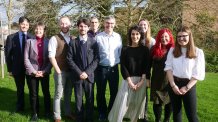Articles

Keynote speaker Derek Niemann with seminar leaders at the University of Exeter’s Holocaust Memorial Day event
Teenagers learn of the horrors and legacy of the Holocaust at University of Exeter event
Teenagers learned of the horrors and legacy of the Holocaust – including a secret Nazi family past - as part of a University of Exeter event.
The moving talks and seminars were held to mark Holocaust Memorial Day and the 75th anniversary of the liberation of Auschwitz-Birkenau. Attendees were from secondary schools from across the south west and the day was organised as part of the University of Exeter’s programme of widening participation activities for schools.
Keynote speaker Derek Niemann described how he discovered his grandfather Karl was a member of the SS – a family secret hidden for 65 years. Karl Niemann was a manager of slave labour in Auschwitz, Dachau, Buchenwald and other concentration camps.
Derek, who grew up in Scotland, told the audience of his difficult journey to trace his family’s history and encouraged the teenagers to “speak up” if they see something wrong happening in society today.
He discovered Karl’s job when he googled his family’s German wartime address and realised it was housing built for those in the SS. His talk was illustrated through a series of incredible pictures taken by his grandfather. Some of the pictures, showing family events as well as the SS at work, including at concentration camps, were destroyed by his grandparents when they left their home in Berlin. The house was later occupied by a Jewish family who found the negatives left at the house, and gave them to the Niemann family when they returned to visit the area in which they used to live.
Derek described his grandfather’s journey from World War One prisoner of war to Nazi party member and volunteer. Karl’s oldest children were enrolled in the Hitler Youth and taught to salute a picture of Hitler hanging on the wall at their school. When he lost his job he signed up to work for the SS.
While Karl and his family were enjoying the perks of living in a lovely house on an estate near Berlin Jewish families were being taken into concentration camps. He was a distant man, who his children remembered as always being on “business trips”. When he was at home he preferred to spend time in his garden.
As the war progressed the family relocated to the Alps. Once Derek’s grandmother commented to the family that people were being killed in Dachau because of the smell of burning bodies. Karl told her the Nazis “wouldn’t do that”.
After the war ended Karl was imprisoned, and when he returned his work with the SS was never mentioned.
When asked by the teenagers if he thought his grandfather was evil Derek said: “Every one of us has capacity to do evil. My grandfather did evil because he made bad decisions all the way through his life. He made decisions which benefited him. At the time millions of people did things because it benefitted them. Some did this because they felt scared, others because they could get a better job, or higher pay or others would think better of them.”
Following the talk students attended seminars run by researchers on topics including resistance in the Reinhard camps and ghettoes in Eastern Europe; the key questions the Holocaust raises for us today; the extent to which the British Government knew of the events of the Holocaust during the war and key considerations that need to be made when designing a Holocaust memorial.
The daughter of a Holocaust survivor, Rosemary Schonfeld, ran a seminar where she discussed her family’s story, how genocide takes place, the contemporary relevance of the Holocaust and the power of words as propaganda.
University of Oxford Masters student Barnabas Balint founded this now annual Holocaust Memorial Day event while studying at the University of Exeter and returned to run a seminar on youth and resistance movements during the Holocaust. Closing the event he told teenagers: “We hope this event will bring communities together for a safer, better future. We know that the devastating antisemitic ideology which led to the Holocaust is not gone. Hate crime continues to exist. When we think about the theme of Holocaust Memorial Day 2020 – Stand Together – I hope we will stand together with those suffering persecution today. I hope you will think about how you can live the lessons of this conference in your own lives and ask what you can do to make the world a better place.”
Date: 7 February 2020
